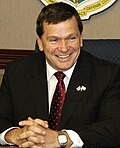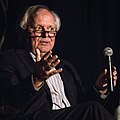Premiers of New Brunswick
| No. | Portrait | Name (Birth–Death) | Term of office | Electoral mandates (Assembly) | Political party | Riding | Ref. | ||
|---|---|---|---|---|---|---|---|---|---|
| Leader of the Government of the Colony of New Brunswick (1854–1867) | |||||||||
| 1 (1 of 2) |  | Charles Fisher (1808–1880) | 1 November 1854 | May 1856 | 1854 election (16th Leg.) | Non-partisan | MLA for York | [4] | |
| 2 |  | John Hamilton Gray (1814–1889) | 21 June 1856 | June 1857 | 1856 election (17th Leg.) | Non-partisan | MLA for Saint John County | [5] | |
| 3 (2 of 2) |  | Charles Fisher (1808–1880) | 1 June 1857 | 19 March 1861 | 1857 election (18th Leg.) | Non-partisan | MLA for York | [4] | |
| 4 |  | Samuel Leonard Tilley (1818–1896) | 19 March 1861 | March 1865 | Appointment (18th Leg.) | Non-partisan | MLA for Saint John City | ||
| 5 |  | Albert James Smith (1822–1883) | 21 September 1865 | 14 April 1866 | 1865 election (20th Leg.) | Anti-Confederation | MLA for Westmorland | [6] | |
| 6 |  | Peter Mitchell (1824–1899) | 14 April 1866 | August 1867 | Appointment (20th Leg.) | Confederation (Ldr. 1866) | Legislative Councillor for colony at-large | [7] | |
| Premiers of the province of New Brunswick since Confederation (1867–present) | |||||||||
| 1 |  | Andrew R. Wetmore (1820–1892) | 16 August 1867 | 25 May 1870 | Appointment (21st Leg.) | Confederation (Ldr. 1867) | MLA for Saint John City | [8] | |
| 2* (1 of 2) |  | George E. King (1839–1901) | 9 June 1870 | 21 February 1871 | Appointment (21st Leg.) | Conservative (Ldr. 1870) | MLA for Saint John County | [9] | |
| 3 |  | George L. Hathaway (1813–1872) | 21 February 1871 | 5 July 1872 | Appointment (22nd Leg.) | Conservative (Ldr. 1871) | MLA for York | ||
| 4* (2 of 2) |  | George E. King (1839–1901) | 5 July 1872 | 3 May 1878 | Appointment (22nd Leg.) | Conservative (Ldr. 1872) | MLA for Saint John County | [9] | |
| 5 |  | John James Fraser (1829–1896) | June 1878 | 25 May 1882 | 1878 election (24th Leg.) | Conservative (Ldr. 1878) | MLA for York | [10] | |
| 6 |  | Daniel L. Hanington (1835–1909) | 25 May 1882 | February 1883 | Appointment (24th Leg.) | Conservative (Ldr. 1882) | MLA for Westmorland | [11] | |
| 7 |  | Andrew G. Blair (1844–1907) | 3 March 1883 | 17 July 1896 | Appointment (25th Leg.) | Liberal (Ldr. 1879) | MLA for York (1876-1892) MLA for Queens | [12] | |
| 8 |  | James Mitchell (1843–1897) | 17 July 1896 | 29 October 1897 | Appointment (29th Leg.) | Liberal (Ldr. 1896) | MLA for Charlotte | ||
| 9 |  | Henry Emmerson (1853–1914) | 29 October 1897 | 31 August 1900 | Appointment (29th Leg.) | Liberal (Ldr. 1897) | MLA for Albert | [13] | |
| 10 |  | Lemuel J. Tweedie (1849–1917) | 1 September 1900 | 2 March 1907 | Appointment (30th Leg.) | Liberal (Ldr. 1900) | MLA for Northumberland | ||
| 11 |  | William Pugsley (1850–1925) | 6 March 1907 | 31 May 1907 | Appointment (31st Leg.) | Liberal (Ldr. 1907) | MLA for Kings | ||
| 12 |  | Clifford W. Robinson (1866–1947) | 31 May 1907 | 24 March 1908 | Appointment (31st Leg.) | Liberal (Ldr. 1907) | MLA for Westmorland | ||
| 13 |  | John Douglas Hazen (1860–1937) | 24 March 1908 | 10 October 1911 | 1908 election (32nd Leg.) | Conservative (Ldr. 1899) | MLA for Sunbury | ||
| 14 |  | James Kidd Flemming (1868–1927) | 16 October 1911 | 6 December 1914 | Appointment (32nd Leg.) | Conservative (Ldr. 1911) | MLA for Carleton | [14] | |
| 15 |  | George Clarke (1857–1917) | 6 December 1914 | 1 February 1917 | Appointment (33rd Leg.) | Conservative (Ldr. 1914) | MLA for Charlotte | [15] | |
| 16 |  | James A. Murray (1864–1960) | 1 February 1917 | 4 April 1917 | Appointment (33rd Leg.) | Conservative (Ldr. 1917) | MLA for Kings | [16] | |
| 17 |  | Walter E. Foster (1873–1947) | 4 April 1917 | 1 February 1923 | 1917 election (34th Leg.) | Liberal (Ldr. 1916) | MLA for Victoria (1917-1920) MLA for Saint John City | [17] | |
| 18 |  | Peter J. Veniot (1863–1936) | 28 February 1923 | 10 September 1925 | Appointment (35th Leg.) | Liberal (Ldr. 1923) | MLA for Gloucester | [18] | |
| 19 |  | John B. M. Baxter (1868–1946) | 14 September 1925 | 19 May 1931 | 1925 election (36th Leg.) | Conservative (Ldr. 1925) | MLA for Saint John County | [19] | |
| 20 |  | Charles D. Richards (1879–1956) | 18 May 1931 | 2 June 1933 | Appointment (37th Leg.) | Conservative (Ldr. 1931) | MLA for York | [20] | |
| 21 |  | Leonard P. D. Tilley (1870–1947) | 1 June 1933 | 12 July 1935 | Appointment (37th Leg.) | Conservative (Ldr. 1933) | MLA for Saint John City | [21] | |
| 22 |  | Allison A. Dysart (1880–1962) | 16 July 1935 | 13 March 1940 | 1935 election (38th Leg.) | Liberal (Ldr. 1926) | MLA for Kent | [22] | |
| 23 |  | John B. McNair (1889–1968) | 13 March 1940 | 7 October 1952 | Appointment (39th Leg.) | Liberal (Ldr. 1940) | MLA for Victoria (1940-1944) MLA for York | ||
| 24 |  | Hugh John Flemming (1899–1982) | 8 October 1952 | 11 July 1960 | 1952 election (42nd Leg.) | Progressive Conservative (Ldr. 1951) | MLA for Carleton | ||
| 25 |  | Louis Joseph Robichaud (1925–2005) | 12 July 1960 | 11 November 1970 | 1960 election (44th Leg.) | Liberal (Ldr. 1958) | MLA for Kent | ||
| 26 |  | Richard Bennett Hatfield (1931–1991) | 11 November 1970 | 27 October 1987 | 1970 election (47th Leg.) | Progressive Conservative (Ldr. 1967) | MLA for Carleton (1961-1974) MLA for Carleton Centre | ||
| 27 |  | Frank McKenna (b. 1948) | 27 October 1987 | 14 October 1997 | 1987 election (51st Leg.) | Liberal (Ldr. 1985) | MLA for Chatham (1982-1995) MLA for Miramichi-Bay du Vin | [23] | |
| 28 |  | Ray Frenette (1935–2018) | 14 October 1997 | 14 May 1998 | Appointment (53rd Leg.) | Liberal (Ldr. 1997) | MLA for Moncton East | ||
| 29 |  | Camille Thériault (b. 1955) | 14 May 1998 | 21 June 1999 | Appointment (53rd Leg.) | Liberal (Ldr. 1998) | MLA for Kent South | ||
| 30 |  | Bernard Lord (b. 1965) | 21 June 1999 | 3 October 2006 | 1999 election (54th Leg.) | Progressive Conservative (Ldr. 1997) | MLA for Moncton East | ||
| 31 |  | Shawn Graham (b. 1968) | 3 October 2006 | 12 October 2010 | 2006 election (56th Leg.) | Liberal (Ldr. 2002) | MLA for Kent | ||
| 32 |  | David Alward (b. 1959) | 12 October 2010 | 7 October 2014 | 2010 election (57th Leg.) | Progressive Conservative (Ldr. 2008) | MLA for Woodstock | ||
| 33 |  | Brian Gallant (b. 1982) | 7 October 2014 | 9 November 2018 | 2014 election (58th Leg.) | Liberal (Ldr. 2012) | MLA for Shediac Bay-Dieppe | ||
| 34 |  | Blaine Higgs (b. 1954) | 9 November 2018 | 2 November 2024 | Appointment (59th Leg.) | Progressive Conservative (Ldr. 2016) | MLA for Quispamsis | ||
| 35 |  | Susan Holt (b. 1977) | 2 November 2024 | incumbent | 2024 election (61st Leg.) | Liberal (Ldr. 2022) | MLA for Fredericton South-Silverwood | ||
* The New Brunswick practice is to count George E. King as the 2nd and 4th premier. [24] | |||||||||
